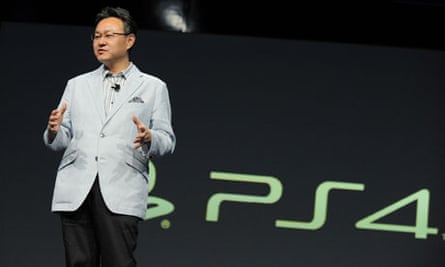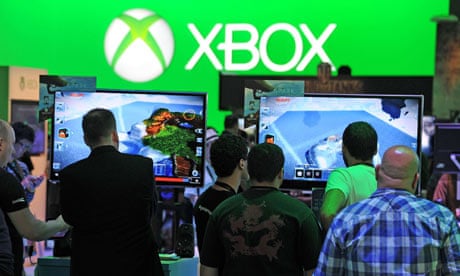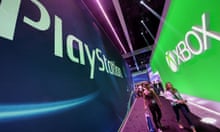The internet won – that's the message flooding Twitter. Microsoft's attempt to restrict the sales of pre-owned games and to tie consoles in to a rigorous online authentication regime has been quashed. Xbox One games will now work like Xbox 360 games – you can buy them, then take them back to your local store to trade them in for something else, or just give them to friends. They won't be tied to you, or your Xbox account; they will be yours to own and keep – well, as much as any commercial media release is yours to own and keep, which is much more complicated than many of us understand.
Obviously, this was not the Xbox One plan – although it may never be clear exactly what the original proposition was. From the unveiling of the console in May, all Microsoft has been able to convey is that the disc you buy games on will now be merely a delivery medium for a digital file that you must download onto your console hard drive and which then becomes subject to DRM restrictions and monitoring. Xbox One games would be like digital goods – theoretically resaleable, but only under certain conditions; theoretically shareable, but only to limited numbers of people. That is all gone now.
There are uncertainties over whether this has been a victory of public pressure, or whether it is more about Microsoft responding to the successful strategy of its rival, Sony. At the PlayStation 4 press conference that took place before this year's giant E3 event in Los Angeles, the Xbox One proposition was mocked and eviscerated – Sony made it clear that pre-owned game sales would be fully supported on its new machine. The crowd went wild; the industry took notice.
In an editorial on news site VG247, veteran games journalist Pat Garratt relates the panic that swept through the games community in the wake of Sony's display: "I was told of turmoil among the developers and publishers assembled in LA. Those that had sided with Microsoft were doing more than wobbling … They were seriously questioning whether or not they'd backed the appropriate horse and were making instant moves to better engage with Sony. Microsoft's policies had been well known for some time, but it was, in fact, the reaction to Sony's E3 showboating that was forcing what appeared to be a movement in content to PS4."

But the question that keeps coming back is whether this is indeed a victory against a greedy controlling mega-corp, or a step backwards for console gaming. No doubt looking at other digital media brands, from iTunes to Netflix, to the PC gaming service Steam, Microsoft envisaged a future where games would go entirely digital; where consumers would be free from paying $60 for a physical disc and then losing money on its depreciated resale. Buried within the corporate talk were some genuinely promising ideas: Xbox One owners would be able to share their digital games with up to 10 friends all over the world; they would be able to sign in to their games library on any Xbox One system; there was the potential for an online exchange service where players would be able to sell on digital game purchases – without having to head to a store with a bundle of game discs and hoping for an OK price. Has the internet really won?
Some industry insiders clearly see this as unambiguously the correct thing to do. "It was absolutely the right decision," says John Pickford, a veteran game developer. "Physical discs are well understood by the consumer and this attempt to control their trade and exchange is a direct attack on consumer rights. There are some benefits to the DRM approach – disk-less installs, etc – but they don't come close to compensating for the restriction in reselling or lending and the forced internet check-in."
But from others there is a sense that Microsoft has had to sacrifice a potentially progressive view of the console industry to win back consumer support. "We didn't give it a chance," says game designer and analyst Will Luton. "We never got to see if this thing worked, and there was a chance it would have brought a lot of benefits. Being able to sell digital games is really interesting. Look, you've never really owned a game, you've owned a licence to it, or access to it through a disc – inevitably everything is going to move to digital distribution where you're going to need some sort of DRM – certainly that's the case on mobile platforms and on Steam. The internet has been so reactionary."
London-based developer Mediatonic also saw the potential in a console where online connection was expected rather than merely supported. CEO Dave Bailey agrees that it's right for Microsoft to put customer concerns first, but saw Xbox One as an interesting test case. "As a company, a lot of our interest lies in the growing field of 'games as a service' – games where the offering continues to grow over time, where the world changes to the feedback and experiences of our players," he says. "We've dedicated a lot of time to developing technology that allows us to tweak games once they've been delivered to players, without requiring huge downloads, patches or updates. However, for that to work, you need to be regularly online so you can grab the latest data and make sure you're up to date.
"The reason why this model has taken off so well in mobile is that, signal willing, you always have that connected experience by default. So in many ways, it was interesting for us that Microsoft was blazing the 'always online' trail. Most console users are now connected to the Internet anyway, so it's not a blocker to us, but it could have been interesting to have a situation where it was all users."
But then, should gamers ever have been put in that position – to have to trust that a whole new way of distributing mainstream console games would be to their benefit? At the centre of this was a vast disconnect between Microsoft's understanding of its audience and what gamers actually were prepared to accept. And the only way out from that is reversal – even if that means abandoning an idea that may have had benefits. "It was the right thing to do from a public relations perspective," says Matt Martin, editor of news site Gamesindustry.biz. "Microsoft got completely destroyed by Sony at E3. Their system is more expensive, it was more restrictive – they needed to claw something back. But the whole entertainment business is transitioning into a digital future and this is a step backwards really. Microsoft was going to try something, but it caved, and I can understand why. When Sony attempted to launch a digital-only version of the PSP it backfired - it was before its time."

There is also the problem of precedence. DRM and games have not had a happy history together. Five years ago major publishers began using a DVD copy protection program called SecuROM to combat piracy, but gamers complained that the software conflicted with other applications and didn't uninstall when the game was removed. There were also huge controversies around titles such as Spore and Mass Effect which required regular and arduous authentication from purchasers. In 2012 publisher Ubisoft was forced to drop its own invasive DRM systems due to a backlash from gamers who found themselves locked out of titles like Assassin's Creed II due to DRM-related server issues.
"There's an element of distrust with the digital business," says Martin. "Look at EA's launch of SimCity – it was a disaster because everyone bought this game, which requires online access, and then no one could get onto the server to play it. I mean, it sounds great, being able to download a game and instantly play it against thousands of people, but the reality is, these things collapse, often they haven't been tested enough – you can't test them enough before they go live. Most people aren't attached to physical goods anymore, they don't feel the need to have physical copies of movies or music – but what they do want is to be able to play their games on day one. But I know that with digital games there are often bugs, and things that need fixing, or the latest firmware update bricks your console – there's always that doubt in the back of my mind. And there will be teething problems like this for at least a couple of years."

Many of those who have been critical of gamer reactions to Microsoft's proposals have pointed to Steam as an example of a positive digital gaming service. Operated by the game developer Valve, this online market place allows PC owners to download everything from indie titles to mainstream hits, many at a much cheaper price than boxed copies. On that system, gamers are unable to resell their digital titles, but Valve may well be looking at a means for allowing the sort of limited sharing facilities that Microsoft proposed for Xbox One – a lot of the thinking in this emerging area of the industry seems to be going in the same direction.
But among the may subtle technical and commercial differences between Steam and the Xbox One concept, there is one really big difference: roll-out. "When Steam came out, it was a slow transition process for gamers," says independent game designer Dan Marshall. "I was still buying major new releases as boxed copies, it took me a long time to change. You need to introduce that process slowly instead of shouting 'this is a new generation, this is how things will work'. If Microsoft had gradually brought it in, perhaps through regular digital sales, if they had got people used to the concept of having a digital library, it would have been a much better approach."
Right now, Microsoft has withdrawn the "good" stuff: it won't allow digital sharing of games with 10 friends, it won't open a digital pre-owned market place. It's tempting to read this as a sort of corporate-scale flounce, but there are obvious considerations. "They need DRM and authentication, there need to be check and balances," says Luton. "I could give a game to 10 people and if none of them ever go on the internet, they have effectively got it indefinitely and for free. There needs to be something in place for that gifting system to work. Microsoft must be certain that if the system supports the gifting of a game to one person, then only one person does get that game – without authentication, people could just bypass the official marketplace entirely."
This may, in the end, be how Microsoft moves forward. There is clearly a desire to shift away from retail, a desire to change the value chain from developer through to consumer – we all know that desire is prompted by commercial rather than altruistic motivations, but there could still be benefits. "I think the sharing features will come back at a later date, or be added to an Xbox Live subscription and they will probably be well received," says Martin. "Being able to share games digitally with your friends is a good idea. People will welcome it. But you can only dictate to people so much about how they're going to consume their media. People didn't like Microsoft saying, 'this is how you will buy, play and share your games'. Once you start taking away choice, people start getting uppity."

Microsoft wants to make money out of its game business; and it saw a way of making more money in a pipeline it had better control over, and which coincidentally has aspects that may have appealed to consumers in some ways. But it totally failed to communicate them. Perhaps this is all about process rather than function. Over the course of several years, the smartphone gaming sector has grown and transformed into a vast global market, and it is entirely digital; meanwhile, there is no sense of ownership over the hugely successful multiplayer role-playing games that proliferate online. These models slowly evolved with the user-base, and with business models that were tried and sometimes rejected en route.
"I think what Microsoft is trying to do is a great idea – for five to 10 years time," says Marshall. "The general shift toward digital-only, the cloud stuff… it's interesting, but they never explained it properly. I was in the pub on Saturday talking to some non-gamer friends about the controversy, I explained the Xbox One restrictions to them and they were completely dumbfounded about why anyone would buy it. This typifies how gamers have felt right down to their core. At some point in the future this will be fine but we're not there yet, we just don't have the infrastructure to support it."
The problem is, U-turns very rarely completely solve a problem. Microsoft will not convert its fanatical internet opponents in this way – even if it assuages the fears of its current user base. Sure, there are signs that public favour has swung around again pretty fast – as MCV points out, the Xbox One 'Day One' edition is now number two on Amazon UK's video game bestseller list, one place ahead of PS4 (though the Amazon US list has several PS4 packages in the top 10). However, before all this, some people were suspicious about the company's motivations and now they are suspicious about how such ostensibly intrinsic elements of the Xbox One offering have been cast aside over night.
For now, Microsoft has seemingly made the right decision. But it has all been spectacularly naive, a PR clusterbomb, and those looking to build a digital entertainment businesses over the next five years would do well to perform a forensic analysis on what went wrong. It is unimaginable and yet it happened, and now we all have to figure out where games go from here.
[This article has been updated since its original publication, with new details and quotes.]






Comments (…)
Sign in or create your Guardian account to join the discussion